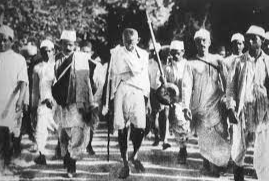
On October 2, 2023, we commemorate the 154th birth anniversary of Mahatma Gandhi, the Father of the Nation, a remarkable leader in our nation's history. Gandhi, born in 1869 in Gujarat, played a pivotal role in India's struggle for independence from British rule through non-violence. His upbringing in a loving Hindu family shaped his character with values of honesty, kindness, and simplicity. Gandhi Jayanti, celebrated every year on October 2, We have some great ideas for school students, such as board decoration, a Gandhi Jayanti 2023 speech, an essay about Gandhi Jayanti 2023, and information about Mahatma Gandhi's life journey. These resources will help students learn about his life and the lessons he taught. Gandhi's legacy of non-violence and social justice continues to inspire people around the world, which is why this day is also celebrated as the International Day of Non-Violence. Gandhi's teachings about non-violent resistance, simplicity, and self-discipline provide valuable guidance for creating a fair and peaceful world.
Gandhi Jayanti 2023 Speech in English
On October 2, 2023, we commemorate the 154th birth anniversary of Mahatma Gandhi, the Father of the Nation, a remarkable leader in our nation's history. Below we are offering concise 15-line speeches about Mahatma Gandhi, suitable for Gandhi Jayanti 2023. We remember Bapu's dedication to India's independence through non-violence and his principles of Ahimsa, inspiring us to work towards a better society.
Long Speech on Gandhi Jayanti 2023
Below, we are providing long speech on Gandhi Jayanti 2023, serving as a valuable reference for school students engaged in competitions.Good morning, respected principal, teachers, and my wonderful friends. We have gathered here to celebrate the 154th birth anniversary of Mahatma Gandhi, born on October 2, 1869, on this Gandhi Jayanti 2023. Today, we pay tribute to the man often referred to as the "Father of the Nation," Mohandas Karamchand Gandhi, for his pivotal role in India's fight for freedom.
This day carries immense historical significance as it commemorates the man who steered India toward independence through principles such as truthfulness, non-violence, and peaceful disobedience of unjust laws.
Mahatma Gandhi, affectionately known as Bapu, was born on October 2, 1869, in Porbandar, Gujarat. He led a simple and humble life, tirelessly working to establish fairness and justice for all.
Non-violence, which Gandhi termed Ahimsa, was a cornerstone of his philosophy. He believed that conflicts and disputes could be resolved without causing harm to anyone. This belief led to significant events like the Salt March and the Quit India Movement, which played a pivotal role in our struggle for freedom from British rule.
Gandhi propagated an essential concept known as Satyagraha, signifying the strength of truth. He demonstrated that one could achieve their goals by doing what is right without causing harm. His influence inspired countless individuals to embrace the path of truth and non-violence, a way of life that continues to guide us today.
Gandhi's life epitomized simplicity. He adorned himself in plain attire, led a modest lifestyle, and advocated the dignity of manual labor. His famous words, "Be the change you wish to see in the world," remind us that change begins from within.
Swachh Bharat Abhiyan, our nation's cleanliness campaign, pays homage to Gandhi's emphasis on hygiene and sanitation. He believed that cleanliness encompassed not only physical cleanliness but also purity of mind and heart.
Equality was another principle close to Gandhi's heart. He vehemently opposed caste discrimination and tirelessly worked to uplift the marginalized. His efforts paved the way for a more inclusive India.
Today, as we remember the Mahatma on Gandhi Jayanti 2023, it is crucial to reflect on the enduring relevance of his teachings. In a world marred by conflict, Gandhi's message of non-violence and truth serves as a guiding beacon.
Gandhi's legacy extends beyond India; it is a global source of inspiration. Leaders such as Martin Luther King Jr. and Nelson Mandela drew deep inspiration from his ideas and methods of peaceful resistance.
On this Gandhi Jayanti 2023, let us pledge to uphold the important ideals cherished by Bapu. We should endeavor to make the world cleaner, fairer, and more peaceful. Let us emulate Gandhi by instigating positive changes in our actions and thoughts, ensuring that his memory endures through our deeds.
Gandhiji breathed his last on January 30, 1948, uttering the words "Hey Ram." He was assassinated by Nathuram Godse and now rests at Raj Ghat in New Delhi. Many pay their respects by adorning flower garlands and singing his favorite song, 'Raghupati Raghav Raja Ram.'
Gandhi Jayanti is more than just a day of remembrance; it is a day of introspection and inspiration. Let us all strive to be the change we wish to see in the world, just as Mahatma Gandhi did. Happy Gandhi Jayanti 2023
Also Read - Gandhi Jayanti Speech in English For School Students
Short Speech on Gandhi Jayanti 2023
Below, we are providing Short speech on Gandhi Jayanti 2023, serving as a valuable reference for school students engaged in competitions.Good morning, respected Principal, teachers, and friends. Today, we celebrate the 154th birth anniversary of the "Father of the Nation," Mahatma Gandhi, born on October 2, 1869, on this Gandhi Jayanti 2023. His principles of truth, non-violence, and civil disobedience played a crucial role in India's struggle for freedom, making this day a historic milestone in our history.
Mahatma Gandhi was a great leader of our country. He was born on October 2, 1869, and he taught us some very important things that we can all learn from.
Gandhi ji believed in "Ahimsa," which means non-violence. He said that problems can be solved without fighting or hurting anyone. He showed us that even in tough times, we can be strong without being mean.
He also believed in "Satyagraha," which means the power of truth. Gandhi ji always told the truth and said that speaking the truth can change the world. He used peaceful ways to fight for our country's freedom.
Gandhi ji lived a simple life. He wore simple clothes and ate simple food. He taught us that we don't need a lot of things to be happy. Being content with what we have is important. On January 30, 1948, when he was 78 years old, Mahatma Gandhi was assassinated by Nathuram Godse. His final resting place, called Raj Ghat, is located in Delhi. Even though he is no longer with us, his teachings and guidance will always be remembered. His last words were 'Hey Ram,' and his motto was 'My life is my message.'
So, on Gandhi Jayanti 2023, we remember these important lessons from him. We should be kind to others, tell the truth, and live a simple and honest life.
Let's try to follow Gandhi's teachings in our lives and make our country a better place.
Thank you for listening. Happy Gandhi Jayanti 2023!
Jai Hind!
15 Line Gandhi Jayanti 2023 Speech
The 15-line speech about Mahatma Gandhi is very useful for young kids because it presents information about him in a simple and easy way.
- Today, on Gandhi Jayanti 2023, we celebrate the birthday of Mahatma Gandhi, born on October 2, 1869.
- Gandhi ji was a great leader who believed in non-violence, meaning not hurting a
- He showed us that problems can be solved without fighting or violence.
- He also taught us the power of truth, known as "Satyagraha."
- Speaking the truth is important, and it can change the world.
- Gandhi ji lived a simple life, wearing simple clothes and eating simple food.
- He said we should be content with what we have.
- On this day, we remember his teachings of kindness, truth, and simplicity.
- He played a significant role in India's freedom struggle.
- His ideas of peace and non-violence still inspire us today.
- Let's follow his path to make our country a better place.
- Be kind to others, always tell the truth, and live a simple and honest life.
- Gandhi ji's legacy continues to guide us in building a better future.
- We can learn from him and work together for a more peaceful world.
- Happy Gandhi Jayanti 2023! Jai Hind!
Mahatma Gandhi: The Father of Indian Independence
Mahatma Gandhi, also known as Mohandas Karamchand Gandhi, was a revered Indian leader who played a pivotal role in India's struggle for independence from British rule. Born on October 2, 1869, in Porbandar, Gujarat, he became an iconic figure worldwide for his peaceful approach to protest and resistance against unfair rules.
Gandhi was raised in a loving Hindu family that instilled values of honesty, kindness, and simplicity. His parents, Karamchand Gandhi and Putlibai, shaped his character and guided his choices in life.
Education and Legal Career
Gandhi pursued his education in law in London, subsequently launching his legal career in South Africa. It was here that he began his journey as a social and political activist, witnessing the racial discrimination faced by Indians and igniting his passion for justice and equality.
The Birth of Nonviolent Resistance
During his time in South Africa, Gandhi developed the concept of Satyagraha, which translates to "truth force" or "soul force." This philosophy emphasized nonviolent resistance as a potent means of achieving social and political change. Gandhi's Satyagraha principles included civil disobedience, non-cooperation, and passive resistance, which later became the cornerstone of his struggle for Indian independence.
Return to India
In 1915, Gandhi returned to India with a mission to help his fellow countrymen attain freedom from British colonial rule. His leadership and advocacy for nonviolent protest quickly garnered widespread attention and support. Gandhi's ability to unite people from diverse backgrounds and religions under the banner of nonviolence was remarkable and became a driving force behind the Indian independence movement.
Champion of Social and Economic Equality
Gandhi's activism extended beyond the fight for political independence. He was deeply committed to social and economic justice, advocating for the upliftment of marginalized communities, including the untouchables (Dalits) and peasants. His efforts encompassed campaigns to abolish the caste system, promote education for all, and alleviate poverty.
Salt March and Civil Disobedience
One of the most iconic events during Gandhi's leadership was the Salt March, also known as the Dandi March, in 1930. Gandhi, accompanied by supporters, undertook a 240-mile walk to the Arabian Sea to protest British control over salt production and sales. This act inspired many in India and garnered international attention.

Independence and Partition
After years of nonviolent struggle, India finally achieved independence from British rule on August 15, 1947. However, this joy was tempered by religious tensions between Hindus and Muslims, leading to the partition of India and the creation of Pakistan. Gandhi vehemently opposed this division and undertook hunger strikes to promote peace and unity.
Assassination and Legacy
Tragically, on January 30, 1948, Mahatma Gandhi was assassinated by Nathuram Godse, a Hindu nationalist who disagreed with Gandhi's ideas on religious tolerance and nonviolence. Despite his untimely death, Gandhi's legacy endures, inspiring movements for peace and justice worldwide.
Gandhi Jayanti 2023 Board Decoration Ideas for School Students
Gandhi Jayanti, celebrated on October 2nd every year, marks the birth anniversary of Mahatma Gandhi, the Father of the Nation, in India. This special day offers schools across the country a chance to pay homage to Gandhi by engaging in various creative activities. One such activity is board decoration. Decorating school boards with imaginative and meaningful ideas not only adds to the festive atmosphere but also aids students in learning about Mahatma Gandhi's life and teachings. Here are some exciting Gandhi Jayanti board decoration ideas for school students in 2023.
1. Theme-Based Board Decoration
Selecting a specific theme can be an effective way to decorate the school board for Gandhi Jayanti. Themes can convey a message or highlight particular aspects of Mahatma Gandhi's life and work. Here are a few theme ideas:
"Ahimsa" (Non-Violence): Create a board showcasing Gandhi's quotes on non-violence and its relevance in today's world.
"Charkha and Khadi": Highlight Gandhi's connection to the charkha (spinning wheel) and khadi (hand-spun cloth) as symbols of self-reliance and freedom.
"Dandi March" : Explore the historic significance of the Dandi March (Salt March) in India's fight for independence.
"Gandhi's Quotes": Feature inspirational quotes by Gandhi that reflect his profound philosophy.
2. Gandhi Life Timeline Board Decoration
Create a timeline of Mahatma Gandhi's life on the board. Show the key events and milestones in chronological order, using images, dates, and brief descriptions. This helps students understand the evolution of his thoughts and actions.
3. Collage of Gandhi Photographs
Craft a collage using photographs of Mahatma Gandhi from his youth to old age. Present them in chronological order, like a visual biography.
4. Salt Satyagraha Board
Dedicate the board to the Salt Satyagraha, showcasing images and information about this pivotal movement in India's struggle for independence. Include a symbolic container of salt.
5. Creative Artwork
Encourage artistic expression by having students draw or paint a portrait of Mahatma Gandhi on the board. Accompany it with a short biography and some of his famous quotes.
6. Interactive Board Decoration
Create an interactive board with puzzles, quizzes, or riddles related to Gandhi's life and philosophy. Use removable elements for engagement.
7. Gandhi's Influence Worldwide
Illustrate Gandhi's global impact by marking countries and events on a world map where his principles inspired movements for social change.
8. Sustainability and Swachh Bharat
Connect Gandhi's ideals of simplicity and cleanliness with modern initiatives. Decorate the board with eco-friendly materials and promote cleanliness and environmental conservation.
9. Inspirational Messages
Encourage students to write their own messages or quotes inspired by Mahatma Gandhi. Display these alongside their names or class details for a personal touch.
Gandhi Jayanti provides an excellent opportunity for schools to educate students about Mahatma Gandhi's life and principles. By decorating school boards creatively and informatively, students can gain a deeper understanding of Gandhi's legacy and the values he embodied. These decoration ideas for Gandhi Jayanti 2023 enhance both the visual appeal of the celebration and the educational experience of the students.
Essay on Gandhi Jayanti 2023 in English for School Students
Gandhi Jayanti, observed on October 2nd, honors Mahatma Gandhi, a leader who shaped India's destiny and inspired the world with his nonviolent philosophy. This day holds global significance as the International Day of Non-Violence.
Gandhi, known as the "Father of the Nation," advocated non-violence and civil disobedience for social justice. His life and teachings continue to influence people worldwide.
The day is celebrated with prayer meetings, marches promoting peace, and community service activities. People pay tribute at Gandhi's memorial sites and observe a moment of silence at 11 AM.
Gandhi's lessons include non-violent resistance, simplicity, and self-discipline, providing timeless guidance for a more just and peaceful world.
How Gandhi Jayanti 2023 Celebrated in India
Gandhi Jayanti is a national holiday celebrated on October 2nd. The day begins with a prayer meeting at Raj Ghat, Gandhi's memorial in New Delhi. Political leaders, activists, and people from all walks of life pay their respects by laying flowers or garlands on his samadhi. Devotional songs and readings from Gandhi's favorite scriptures are part of the event.
Non-violent marches or padayatra are iconic on Gandhi Jayanti, spreading his message of peace, love, truth, and non-violence. These marches promote communal harmony and unity.
Community service activities are integral to the celebration, including blood donation camps, tree plantation drives, and free health check-ups. These activities uphold Gandhian ideals of selflessness and service.
Rituals and Customs on Gandhi Jayanti 2023
Gandhi Jayanti customs include offering prayers and floral tributes at Raj Ghat and visiting Sabarmati Ashram. A moment of silence at 11 AM is observed across public places as a mark of respect for Mahatma Gandhi.
Lessons from Gandhi's Life
Gandhi's life imparts valuable lessons:
Non-Violent Resistance: Gandhi demonstrated that non-violence is a potent tool for social and political change.
Simplicity: He lived a simple life, emphasizing inner peace over material possessions.
Self-Discipline: Gandhi's discipline in daily routines contributed to personal and societal growth.
Gandhi Jayanti honors a remarkable leader who continues to inspire with his timeless principles. It reminds us to embrace nonviolence, simplicity, and self-discipline in our pursuit of a just and peaceful world. Mahatma Gandhi's legacy endures, serving as a beacon of hope for humanity.
Gandhi Jayanti 2023: Essay in English (100 Words)
Gandhi Jayanti, celebrated as a national holiday in India, commemorates the non-violent freedom struggle led by Mahatma Gandhi. This significant day is marked by various activities, including prayer meetings, seminars, and cultural events held throughout the country. It serves as a platform for people to reflect upon Gandhi's enduring principles of peace, justice, and social harmony, emphasizing their continued relevance in today's world. Gandhi Jayanti inspires individuals to embrace these values and work towards a more peaceful and just society, carrying forward the legacy of Mahatma Gandhi.
Gandhi Jayanti Essay in English (Short Essay)
Mahatma Gandhi, a staunch advocate of non-violence and civil disobedience, stands as an iconic figure in India's struggle for independence from British colonial rule. Gandhi Jayanti, celebrated annually on October 2nd, serves as a profound tribute to this remarkable leader whose contributions have left an indelible mark on history. The day is marked by various activities, including prayer meetings, seminars, and the melodious recitation of his favorite hymns.
One distinguishing feature of this occasion is the "Swachh Bharat Abhiyan" or Clean India Campaign, launched on Gandhi Jayanti in 2014. This initiative is deeply rooted in Gandhi's emphasis on cleanliness and hygiene, encouraging citizens across India to actively participate in maintaining clean surroundings. It underscores Gandhi's famous quote, "Cleanliness is next to godliness," highlighting the significance of cleanliness in our daily lives.
Gandhi's enduring legacy extends far beyond India's borders, resonating with individuals globally. His philosophy of truth and non-violence continues to serve as a guiding light for achieving positive change in society. Gandhi Jayanti serves as a reminder of these values, urging us to apply his principles in our pursuit of a more just and equitable world. It calls upon us to draw inspiration from Gandhi's life and teachings, fostering a commitment to truth and non-violence in our own actions. Through these efforts, we can collectively contribute to a more peaceful and harmonious global community.
Also Read - Gandhi Jayanti Essay in English for School Students
Gandhi Jayanti Essay in English (Long Essay)
Gandhi Jayanti, an annual observance on October 2nd, holds profound significance for Indians and peace advocates worldwide. It transcends mere ritual; it's a deep homage to Mahatma Gandhi's enduring legacy. Born in Porbandar, Gujarat, on October 2, 1869, Gandhi left an indelible mark through his philosophy of non-violence, known as "Ahimsa," and unwavering dedication to social justice.
Gandhi's conviction in non-violence as a means to foster social and political change forms the bedrock of his philosophy. He demonstrated that violence only spawns more violence, stressing that authentic transformation can solely arise from peaceful resistance and civil disobedience. His commitment to non-violence is exemplified by the iconic 1930 march to the Arabian Sea, protesting the British salt monopoly.
Gandhi Jayanti serves as a day when India honors this exceptional leader through diverse activities and events. Prayer meetings are convened at numerous locations, including Raj Ghat in Delhi, his cremation site. Educational institutions arrange special assemblies and seminars to acquaint students with Gandhi's life and philosophy. Cultural programs and exhibitions vividly portray his life and India's struggle for freedom.
A distinctive facet of Gandhi Jayanti is the "Swachh Bharat Abhiyan" (Clean India Campaign), launched in 2014. This initiative, inspired by Gandhi's stress on cleanliness and sanitation, motivates citizens to actively cleanse their surroundings and uphold hygiene. It underscores Gandhi's renowned adage, "Cleanliness is next to godliness," accentuating the significance of cleanliness in our daily lives.
Gandhi Ji message resonates far beyond national borders, touching hearts globally. Gandhi Jayanti transcends mere celebration; it serves as a day of introspection and action. It reminds us of the enduring relevance of Gandhi's teachings in a world marred by conflicts and elusive justice. It implores us to uphold the values of truth, non-violence, and social justice in our personal lives and society. Gandhi's life and legacy perpetually inspire humanity toward a more equitable, peaceful, and compassionate world.
In essence, Gandhi Jayanti is a day to commemorate Gandhi's invaluable contributions and perpetuate his message of love, peace, and social harmony, enriching the fabric of our global community.
Gandhi Jayanti Essay in English (9 Lines)
Here, we present a concise 9-line essay on Gandhi Jayanti, which can be a valuable resource for school students participating in competitions.- Gandhi's unwavering commitment to peaceful resistance and civil disobedience inspired change.
- This national holiday in India honors Gandhi's principles of truth, non-violence, and civil disobedience.
- Gandhi played a pivotal role in India's peaceful struggle for independence from British colonial rule.
- His legacy reminds us that individual actions can bring profound societal change.
- On this day, prayer meetings, seminars, and cultural events pay tribute to Gandhi's legacy.
- Gandhi Jayanti also launched the "Swachh Bharat Abhiyan," a cleanliness campaign.
- Gandhi's philosophy of non-violence continues to inspire global peace and justice movements.
- His life and teachings inspire individuals striving for positive change.
- In essence, Gandhi Jayanti commemorates his contributions and promotes love, peace, and social harmony.
Gandhi Jayanti 2023 FAQs
What is Gandhi Jayanti?
When is Gandhi Jayanti celebrated in 2023?
Why is Gandhi Jayanti significant?
How do people in India celebrate Gandhi Jayanti?
What is the "Swachh Bharat Abhiyan" associated with Gandhi Jayanti?













